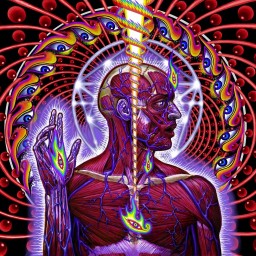 Review by Saxy S for Tool - Lateralus (2001)
Review by Saxy S for Tool - Lateralus (2001)
Tool are one of music most complicated acts to talk about. Their music can be defined under so many different genres of music (not just metal), and yet with each genre identifier, there are hundreds of people ready to rebuke your argument one way or another. They seem like the kind of band that make heavy metal, even though they seemingly resent making it. Tool is not music meant for the simple mind, but rather for those looking to be taken on a journey; one through drastic twists and turns, and usually culminating in a terrifying ending.
And that statement could not be any more true with the bands 2001 magnum opus, Lateralus. Having gone back and listened to it again for this review, I realize that my opinion on the album may be shaded by rose coloured glasses and I'm willing to accept that. But let me be clear, this album is the bands best. And there are very few albums across any genre that can live up to the ridiculous amount of thought and care that was put into this.
With few exceptions (Fleetwood Mac's Rumors, Deep Purple's Machine Head, Iron Maiden Seventh Son of a Seventh Son and maybe Opeth's Still Life), I can't recall a single album that I have listened to more during my lifetime. I think that part of that has to do with this album's framing. Lateralus is the first album of Tool's that begins experimenting with post-metal and the guitar work from Adam Jones is stunning. I absolutely love the unison melody in the final portions of "The Patient", the slow build and melodic dominance of "Reflection" and "Parabola" with it's excellent composition.
Of course, when it comes to Tool albums, bass is essential. And Justin Chancellor has never sounded better. I don't believe the band has ever been able to make the bass serve this much importance since. Everyone already knows the great hook on "Schism", but don't forget about "The Grudge", "Lateralus" and "Ticks & Leeches".
Maynard James Keenan's performance on this record is second to none. His vocal timbre fits with every song brilliantly. "Schism" is one of the albums simplest tunes, and Maynard's vocals reflect that. On "The Grudge" and "Lateralus", tests the range of his pipes. And speaking of testing the pipes, Maynard delivers a gripping display on "Ticks & Leeches"; I never thought I needed a screaming Maynard, but here we are!
Beyond the sound of the album, Tool are telling a story throughout this album. It's cryptic, mysterious and introspective; one that tests its listener to listen to every single note that is being played. Why? Because every note has a purpose; nothing is tossed in "just for show". As Maynard so eloquently proclaims during one of he title tracks pre-choruses: "Reaching out to embrace the random, reaching out to embrace whatever may come". But it isn't. "Random" is only perceived by the listener. Just like the Fibonnaci sequence in which Lateralus gets its name, the numbers may seem random, but they are simply an expansion on the previous numbers. It's why "The Grudge", "Reflection", "Ticks & Leeches" and of course "Parabol" and "Parabola" make sense; the themes from the beginning always return to the forefront, even when it seems like the tune is about to descend into total chaos.
When I compare this album to one of my other favourite progressive metal albums, The Human Equation, this album is deceptive and ever fruitful, whereas Ayreon's epic can quickly run out of new items to listen for. Not here. Since every note serves a distinct purpose, it's nearly impossible to dissect every orifice in one playthrough. As a result, it can be a daunting listen, and not just because it's nearly eighty minutes. But since this album introduced me to progressive metal as a sub-genre, I have to praise it for it's uniqueness, even two decades later. In summary, this album turned me into a prog snob. So thanks Tool, for whatever that means.
